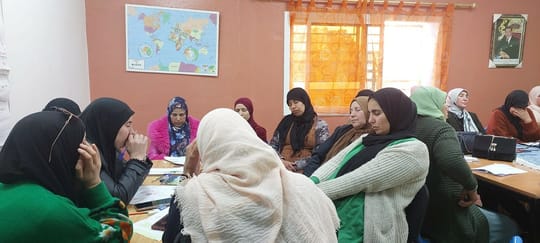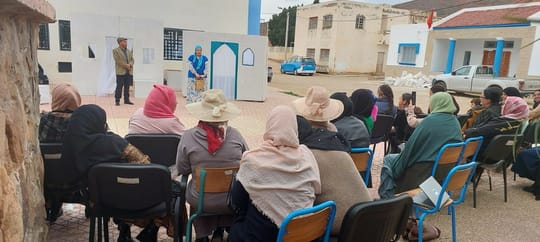Navigating Silence: Women's Journey in Beni Yeteft's Village

During the psychosocial empowerment workshop in Beni Yeteft village, Snada municipality, I had the opportunity to get to know the women of the Amal Association, who initially appeared introverted. However, as the session progressed, it became evident that they harbored a wealth of thoughts and emotions that they had not vocalized for years.
Despite their initial hesitance, their silence spoke volumes about the depth of their experiences and the challenges they've faced. The women of the Amal Association not only carried unspoken stories but also bore the weight of numerous challenges, particularly in commuting from their homes in the mountains to participate in local activities. They arrived, using whatever transportation they could secure from their remote houses to the local meeting place of the association, demonstrating their determination to overcome both natural barriers, the elements and logistical challenges.
Their journey to attend the workshop symbolized a silent struggle against geographical barriers, limited resources, and societal norms that often restrict women's mobility. Beni Yeteft village, nestled within the rugged landscapes of the Rif region, presents a unique set of challenges beyond its physical terrain. It stands out as one of the most demanding communes in terms of the mindset and perspectives of its inhabitants. The traditional values and entrenched beliefs prevalent in this region often create additional layers of complexity for women, constraining their autonomy and opportunities for self-expression. Against this backdrop, the women of the Amal Association confront not only the tangible obstacles of reaching the association meeting place from their mountain dwellings but intangible barriers erected by societal norms and cultural expectations.
Their participation in the psychosocial workshop signifies a subtle yet significant defiance of these entrenched ideologies, signaling a quiet revolution unfolding within the heart of the Rif. It underscores the imperative of fostering dialogue and understanding to challenge outdated attitudes and pave the way for more equitable and inclusive communities.
Their determination to engage in the workshop reflects a deep yearning for connection, support, and the opportunity to address their innermost concerns. Their presence underscores the resilience and fortitude required to navigate daily life in remote areas, amplifying the urgency of creating inclusive spaces that acknowledge and address the multifaceted challenges faced by women in such communities.
"The workshop in Beni Yeteft village was like a breath of fresh air for us," expressed Fatima, one of the attendees. "For so long, we've felt isolated, like our voices didn't matter. But during those days, we felt heard and understood."
And from Khadija, there was a sentiment shared by many: "The kindness and respect shown to us during the workshop meant more than words can express. It wasn't just about the lessons or activities; it was about feeling seen and valued as individuals."

Women of Amal association at workshop's end-of-session play (photo by HAF, 2024)
After the insightful discussions and activities during the psychosocial workshop, the atmosphere in Beni Yeteft village was further enriched by a captivating one-piece theater performance. Originating from the Rif Theatre Team, this poignant portrayal delved into the very challenges and traditions deeply ingrained in the area. The idea for this presentation stemmed from the visionary president of the association, driven by a desire to not only entertain but also uplift the spirits of its members.
As the audience watched in rapt attention, they were transported into the world of Beni Yeteft village, where every silence carried a weighty narrative, and every gesture spoke volumes about the resilience of the human spirit. The performance served as a poignant reminder of the power of art and storytelling to transcend boundaries and give voice to the silenced.
Through this theatrical finale, the participants found solace, inspiration, and renewed hope, reinforcing the bonds of solidarity and resilience within the community.